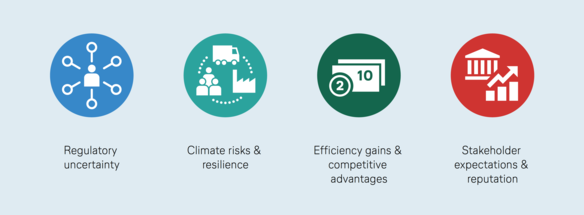The Omnibus package announced by the European Union (EU) is intended to make environmental, social and governance (ESG) reporting requirements much simpler. So, does this mean the concept of sustainability is outdated? If anything, the opposite is true: removing bureaucratic hurdles will open up new opportunities for businesses to act. Discover what this might look like and how you can take advantage in our new whitepaper on sustainability.
Whitepaper: Sustainability – a strategic compass to enhance your competitive position
Improve sustainability and seize new market opportunities with valid data
The EU Omnibus package simplifies ESG reporting requirements and creates scope to leverage sustainability to strategic effect. Companies that systematically analyze their environmental and social impacts can identify risks at an early stage, cut their costs, make their supply chains more resilient and tap into new market opportunities. Sustainability makes employers more attractive, fosters customer loyalty, boosts innovative power and enhances a company’s competitive position.
The key to achieving this lies in taking sound decisions based on valid data. Digital solutions provide transparency in this regard, making it possible to measure, monitor and harness sustainability.
Sustainability pays off
Sustainability is increasingly becoming a hallmark of quality. It enhances a company’s appeal as an employer, fosters customer loyalty and boosts sales. In many sectors, systematic sustainability management is now a precondition for participating in tender processes and securing supply contracts.
This turns sustainability into a commercial opportunity, improving a company’s competitive position, boosting its innovative power and fostering market acceptance. It is crucial that companies actively make use of this new scope and embed sustainability as a fixed element of their strategy – not as a compulsory formality but as a driver of future viability and growth.
- What are the tangible benefits to companies of integrating sustainability into their activities?
- Which regulations does the Omnibus package address?
- What are common misconceptions about the Corporate Sustainability Reporting Directive (CSRD) requirements?
- What are the five decisive benefits of the double materiality analysis?
- New scope for business
By simplifying ESG reporting requirements, the EU is creating additional scope for companies to leverage sustainability as a strategic tool rather than a bureaucratic measure. - Sustainability as a growth driver
Sustainability is becoming a driver of efficiency, resilience, innovation and new business models. Companies that link their environmental and social impacts with commercial risks and potential opportunities enhance their efficiency, innovative power and market position. - Data-based and strategic controlling
Systematic, data-based consideration of environmental and social impacts improves a company’s competitive position, reduces risks and opens up new opportunities. - Commercial advantage
Concrete measures – such as energy management and resource-efficient processes – cut costs, open up new markets, promote innovation, foster cooperation, drive efficiency and improve a brand’s image. - Double materiality analysis
The double materiality analysis (DMA) is a strategic tool that integrates sustainability into a company’s processes, improves cooperation and ensures long-term future viability.


